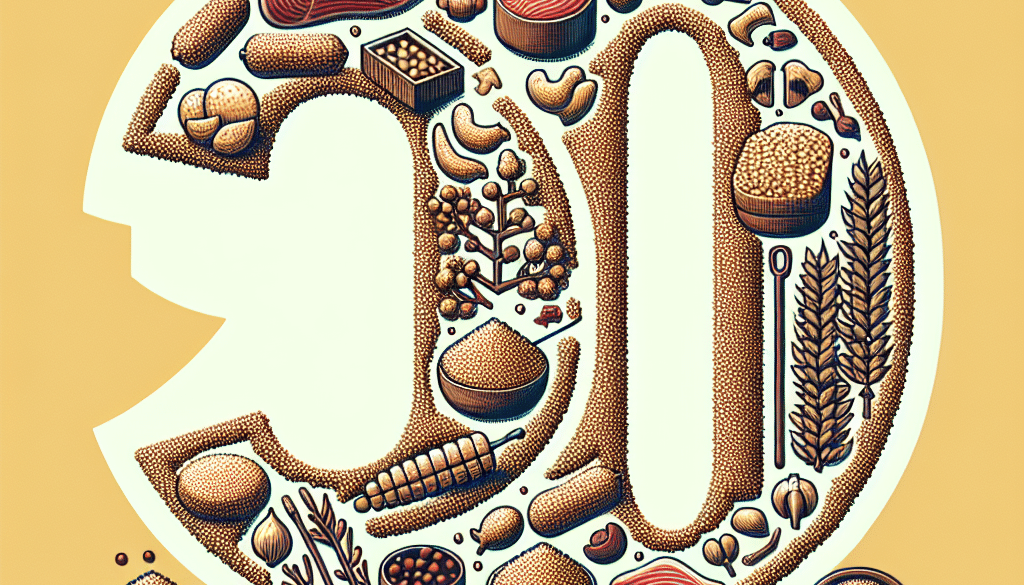Can 30 Quinoa Replace Protein?
-
Table of Contents
- Quinoa as a Protein Powerhouse: Can It Replace Meat?
- Understanding Protein and Its Importance
- Quinoa’s Nutritional Profile
- Comparing Quinoa to Animal Proteins
- Can Quinoa Replace Protein in Your Diet?
- Incorporating Quinoa into a Balanced Diet
- Environmental and Ethical Considerations
- Conclusion: The Role of Quinoa in Protein Consumption
- Discover ETprotein’s High-Quality Protein Products
Quinoa as a Protein Powerhouse: Can It Replace Meat?

Quinoa, often hailed as a “superfood,” has gained popularity worldwide for its nutritional benefits. Packed with protein, fiber, vitamins, and minerals, this ancient grain has become a staple in many health-conscious diets. But can quinoa truly replace animal protein sources in terms of nutritional value and muscle-building capabilities? This article delves into the potential of quinoa as a protein substitute and its implications for both personal health and environmental sustainability.
Understanding Protein and Its Importance
Proteins are essential macronutrients composed of amino acids, which are the building blocks of our body’s tissues, including muscles, skin, and organs. They play a crucial role in various bodily functions, such as hormone production, immune response, and enzyme activity. A balanced intake of protein is vital for maintaining good health and supporting an active lifestyle.
Quinoa’s Nutritional Profile
Quinoa is a seed that is prepared and consumed like a grain. It stands out among plant-based protein sources for several reasons:
- Complete Protein: Unlike most plant proteins, quinoa contains all nine essential amino acids, making it a complete protein. This is particularly important for vegetarians and vegans who may struggle to obtain a full amino acid profile from their diet.
- High Fiber Content: Quinoa is rich in dietary fiber, which aids in digestion, helps control blood sugar levels, and may contribute to weight management.
- Rich in Vitamins and Minerals: It is a good source of B vitamins, vitamin E, magnesium, potassium, calcium, phosphorus, and iron.
- Gluten-Free: Quinoa is naturally gluten-free, making it an excellent option for those with celiac disease or gluten intolerance.
- Antioxidant Properties: It contains flavonoids like quercetin and kaempferol, antioxidants that offer various health benefits.
Comparing Quinoa to Animal Proteins
When comparing quinoa to animal proteins such as meat, poultry, fish, and dairy, it’s important to consider several factors:
- Protein Quantity: Animal proteins typically contain more protein per serving than quinoa. For example, a cup of cooked quinoa contains about 8 grams of protein, whereas a 3-ounce piece of chicken breast boasts around 26 grams.
- Protein Quality: Animal proteins are also complete proteins and are highly bioavailable, meaning the body can easily absorb and utilize them.
- Fat Content: Quinoa is low in fat and does not contain cholesterol, whereas some animal proteins, especially red meats, may be higher in saturated fat and cholesterol.
- Environmental Impact: Producing quinoa generally requires less water and land and emits fewer greenhouse gases compared to raising livestock for meat.
Can Quinoa Replace Protein in Your Diet?
While quinoa can be part of a protein-rich diet, it may not be practical to rely on it solely as a protein source. To meet the Recommended Dietary Allowance (RDA) for protein, which is 0.8 grams per kilogram of body weight per day for the average adult, one would need to consume a large quantity of quinoa, potentially leading to excessive calorie intake.
However, quinoa can be an integral part of a plant-based protein strategy that includes a variety of sources such as legumes, nuts, seeds, and soy products. This approach can ensure a sufficient intake of all essential amino acids and other nutrients.
Incorporating Quinoa into a Balanced Diet
Here are some ways to include quinoa in a balanced diet:
- As a base for salads or bowls, mixed with vegetables, beans, and a healthy fat source like avocado.
- As a substitute for rice or pasta in dishes.
- Incorporated into soups, stews, or casseroles for added texture and nutrition.
- Used to make vegetarian burgers or meatballs.
- As a breakfast cereal, mixed with fruits and nuts.
Environmental and Ethical Considerations
Choosing quinoa over animal proteins can have positive environmental and ethical impacts. Livestock farming is a significant contributor to deforestation, water pollution, and greenhouse gas emissions. By opting for plant-based proteins like quinoa, individuals can reduce their carbon footprint and support more sustainable food systems.
Conclusion: The Role of Quinoa in Protein Consumption
Quinoa is a nutritious and versatile food that can complement a protein-rich diet, especially for those seeking plant-based options. While it may not completely replace animal proteins for everyone, it offers a sustainable alternative with a host of health benefits. By incorporating quinoa alongside other protein sources, individuals can enjoy a varied and balanced diet that supports both their health and the planet.
Discover ETprotein’s High-Quality Protein Products
If you’re looking to diversify your protein intake with high-quality plant-based options, consider ETprotein’s range of organic vegan proteins. Their products, including organic rice protein, pea protein, and various seed proteins, provide excellent alternatives to traditional animal-based proteins. With a commitment to non-GMO, allergen-free ingredients, and high purity levels, ETprotein caters to a wide array of dietary needs and preferences.
Whether you’re involved in sports nutrition, weight management, or general health and wellness, ETprotein offers tailored solutions to meet your protein requirements. Explore their offerings and take a step towards a more sustainable and health-conscious lifestyle.
About ETprotein:
ETprotein, a reputable protein and L-(+)-Ergothioneine (EGT) Chinese factory manufacturer and supplier, is renowned for producing, stocking, exporting, and delivering the highest quality organic bulk vegan proteins and L-(+)-Ergothioneine. They include Organic rice protein, clear rice protein, pea protein, clear pea protein, watermelon seed protein, pumpkin seed protein, sunflower seed protein, mung bean protein, peanut protein, and L-(+)-Ergothioneine EGT Pharmaceutical grade, L-(+)-Ergothioneine EGT food grade, L-(+)-Ergothioneine EGT cosmetic grade, L-(+)-Ergothioneine EGT reference grade and L-(+)-Ergothioneine EGT standard. Their offerings, characterized by a neutral taste, non-GMO, allergen-free attributes, with L-(+)-Ergothioneine purity over 98%, 99%, cater to a diverse range of industries. They serve nutraceutical, pharmaceutical, cosmeceutical, veterinary, as well as food and beverage finished product distributors, traders, and manufacturers across Europe, USA, Canada, Australia, Thailand, Japan, Korea, Brazil, and Chile, among others.
ETprotein specialization includes exporting and delivering tailor-made protein powder and finished nutritional supplements. Their extensive product range covers sectors like Food and Beverage, Sports Nutrition, Weight Management, Dietary Supplements, Health and Wellness Products, and Infant Formula, ensuring comprehensive solutions to meet all your protein needs.
As a trusted company by leading global food and beverage brands and Fortune 500 companies, ETprotein reinforces China’s reputation in the global arena. For more information or to sample their products, please contact them and email sales(at)ETprotein.com today.












